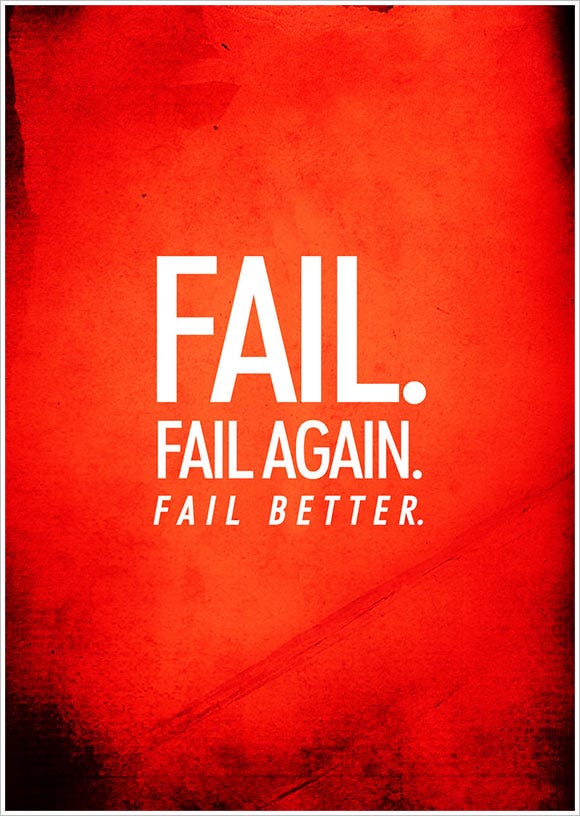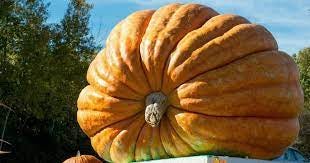THREE FAILURES
The second prize in the doll’s dress contest, the forgotten musical, the unfinished novel: they haunt me still, sort of.
Today I recorded a segment for Elizabeth Day’s wildly successful podcast called How to Fail. You can see why it’s wildly successful: we love stories about other people messing up, as long as they are minor messes and not tragic car crashes. To prepare for the interview with Elizabeth, I was asked to choose three failures of mine – they casually assumed there were at least three. Below, lightly edited and expanded, is what I sent.
–Samuel Beckett
“Do or not do. There is no try.” – Yoda, Star Wars
But in real life there are a lot of tries, and a lot of failures. Which of my many failures shall I choose for you?
I plunge my hand into that grey-tinged flannel-tongued ball of hopelessness, to paraphrase Dylan Thomas, and out come:
Failure 1:
Second prize in the doll’s-dressing contest at something called “Mayfair,” in Toronto, 1949 I think, when I was nine. (Or more likely: May, 1948, when I was eight.) The fair had a game with magnetic fish, the first time I’d ever seen them.
I was always doing sewing projects (or knitting, or crocheting) in those times, nor did I stop for decades – I churned out several items much less worthy than this rather puritanical doll’s outfit that failed to win First Prize. We won’t even mention the yellow shortie coat I constructed as a young teen in 1952, and which caused my mother to bite her tongue so hard she practically couldn’t speak; so this sewing failure, or semi-failure, evidently didn’t discourage me from sewing.
Good practice for a writer, since with the proliferation of prizes you are always failing to win something or other. Not that it’s up to you: you do nothing, you are inert, a pumpkin in the Best Pumpkin contest at the agricultural fair. You are thus blameless: It’s those malign jury members, each with the Evil Eye, who do the foul deed. So the “failure” ought to be theirs, right? Though somehow it is not.
Failure 2:
A children’s Christmas musical called The Festival of Missed Crass, written with the composer Raymond Pannell in the early 1980’s. Christmas in this imaginary world is “Missed Crass,” which the discerning will realize is an anagram of Christmas. It is also forbidden. The creatures in the story live in a cave, and instead of milk they have “drilk.”
Although we got as far as the auditions for a TV version, the production fell apart because it was considered too seasonal. Or nutty. Or something. Catchy tunes, however. And it has resulted in my sister’s saying to me when I’m slow consuming my tea, “Drink your drilk.”
Amazing what fragments may survive a project conflagration.
Blakeney, Norfolk
Failure 3:
My failure to complete the novel I was working on in 1983 and early 84. This was a saga of truly Rubik’s Cube genius and complexity, not that I can even remember what it was going to be called. We were in Blakeney, Norfolk (for the birdwatching), not so posh then as it is now. We were living in a drafty rectory; It was quite cold and there was no central heating. In an easterly wind, the bedroom carpet rippled.
The house was said to be haunted by fourteenth century nuns (in the parlour), a headless woman (in the kitchen), and a jolly cavalier (in the dining room). I never saw the fourteenth century nuns or the headless woman, but I like to feel they were participating. The jolly cavalier did turn up, but he was a befuddled drinker from the pub next door who had wandered into our dining room by mistake.
By day, I worked in a stone fisherman’s cottage rented to tourists in the summers, and supposedly heated by an Aga stove and a fireplace. A sub-failure of this experience was my failure to master either of these heating technologies. As a result, I got chilblains. This was exciting. How Dickensian!
For a while, I pegged away diligently at my literary masterpiece, using a second-hand typewriter that lacked an L (“I ove you,” he murmured. “What is ove?” she replied.) But this novel had too many moving parts. Also, it would have helped to have had a plot.
Then I sort of lost interest, and got distracted by the historical romances left behind by summer visitors – many about Mary, Queen of Scots, who decidedly did have a plot. I also learned a lot about someone called Gay Lord Robert (Robert Dudley, pash of Elizabeth 1 and possible wife murderer. Always of interest.) Then, once I had read all the summer discards, I segued into writing The Handmaid’s Tale – not yet called that – which I’d been avoiding on the grounds that it was too crazy, even for me.
My failed novel became a “manuscript.” Perhaps it will be of interest to scholars. That is an accomplishment of sorts. If ife hands you emons, make emonade.
(But this failure was probably a blessing in disguise. What if I had kept on with the disjointed and L-impoverished novel, and had failed to write The Handmaid’s Tale? What then?)
Here is Elizabeth Day with her successful book on failures. Our conversation should be available soon on her podcast, How To Fail with Elizabeth Day. But she may fail to post it, eh? Or I may have failed to get the link right. Then you will fail in your efforts to listen to it. Such is life.







I’m eft wondering what a stone fisherman uses for bait. What the he+* does he hope to catch?? Founder? Ees?Haibut???
What a treasure to be able to read such humble words by a legend. Your advice on letting manuscripts that aren't meant to be out there float onwards with the wind is particularly helpful. I spent years trying to find the missing letter, only to realize it only existed in the next book.